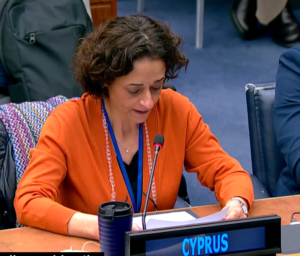 General Discussion – 63rd Session of the Commission for Social Development
General Discussion – 63rd Session of the Commission for Social Development
New York, 11 February 2025
Mr. Chair,
Allow me to extend our warmest appreciation to you, the Members of the Bureau and United Nations’ Department of Economic and Social Affairs, for the preparation of the 63rd Session of the Commission for Social Development.
Cyprus fully aligns with the statement delivered by the European Union. I would like to make some additional remarks in my national capacity.
Mr. Chair,
Despite progress achieved in key social development goals since the World Summit for Social Development held in Copenhagen in 1995, significant challenges persist towards our collective commitment to achieve the 2030 Agenda for Sustainable Development.
Major and persisting inequalities, instability and fragility caused by conflicts, climate change and pandemics pose serious challenges to collective social resilience, threatening to impede the delivery of the commitments of the Copenhagen Declaration on Social Development and the Programme of Action, as well as the implementation of the 2030 Agenda for Sustainable Development.
It is Cyprus firm belief that solidarity and social inclusion are keys to build a cohesive and resilient society through combating poverty, addressing all forms of inequality and reducing social exclusion.
Mr. Chair,
The principle of ‘leaving no one behind’ is well embedded in Cyprus’ policies for social cohesion and inclusion, with a human rights-based and a gender responsive approach.
We are firm in our commitment to promote just, inclusive, and cohesive societies when developing our social welfare policies, enhancing comprehensive social protection systems while ensuring a just, green, and digital transition.
Cyprus places special emphasis in providing accessible, affordable, friendly and targeted social and support services based on a human-centered, multidisciplinary approach. The needs of vulnerable groups, including the needs of persons with disabilities, as well as young and older persons, are taken into serious consideration.
Allow me to mention some examples from Cyprus’ broad social protection policies:
Combating poverty in all its forms and fostering social inclusion is significant for people’s well-being and sense of inclusion. In Cyprus, the Guaranteed Minimum Income is considered adequate and responds to the basic needs of the beneficiaries, including nutrition, housing, healthcare and basic services.
In relation to healthcare, Cyprus launched in 2019 its General Health System offering health coverage to all, based on the provision of high-quality
healthcare services and the principles of universal coverage, financial solidarity, equal access, pursuant also to SDG3.
Undoubtedly, education is also very important in achieving a sustainable future. School attendance in Cyprus is almost universal, securing equal opportunities for all children, without discrimination. Furthermore, the Unit of Education for Environment and Sustainable Development of the Ministry of Education, Sports, and Youth serves as a permanent mechanism for monitoring, reviewing, and evaluating the implementation of the SDGs and climate change education across formal, non-formal, and informal education sectors.
Mr. Chair,
Cyprus is committed to invest in policies that are effective and resilient, anchored in human rights and fundamental freedoms, to address inequalities, uncertainty, and vulnerability.
The upcoming Second World Social Summit offers an opportunity to renew our global commitment to advance social development, strengthen solidarity, social inclusion, and social cohesion, accelerating action towards supporting the implementation of the 2030 Agenda.
I thank you.